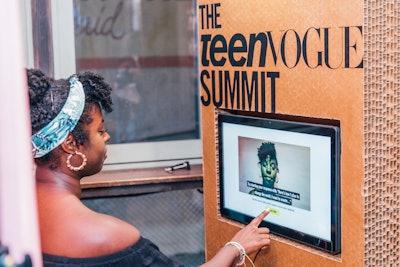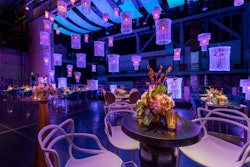
At Digital Media Wire's annual expo for global media and technology executives, held February 4 and 5 at the Marina Del Rey Marriott in Los Angeles, one topic kept popping up: Generation Z, or the 74 million Americans born between 1996 and 2012. Acknowledging this generation's $44 billion in spending power, speakers—who ranged from executives at Facebook and Universal Pictures to influencers and editors—discussed the latest technology and marketing tactics that stand out to the younger generation.
A couple of panelists in particular broke down exactly what makes Generation Z unique, and how brands can use that knowledge to create effective events and marketing campaigns. Here are five ways they think brands should be marketing to today's young adults.
1. Focus on realism and authenticity.
"Authenticity" is a buzzword in events these days, sparked by the desire for real human connections in a tech-driven age. The trend was also sparked, though, by the ways Generation Z approaches the world.
"It's the first generation to have active shooter drills in schools," noted Jayne Charneski, the founder of consulting firm Front Row Insights & Strategy who has worked with brands like PopSugar and MTV. Generation Z grew up, and are still growing up, knowing war, terrorism, economic recession, environmental disaster, and political divisiveness—and because of the Internet and social media, they are more informed than any previous generation. "They see the world as it really is, and they are prepared to act and react accordingly," added Charneski.
So what does this mean for brands? "Young adults value 'keeping it real' above anything else," she said, noting that this is why YouTube is so popular with this group—they see YouTube creators as normal, relatable people giving a glimpse into their everyday lives. According to Charneski, today's teenagers and young adults are drawn to brands that show behind-the-scenes content and are transparent about their mistakes.
"Zs are far more interested in the journey than what it's going to feel like once you get there," she noted, in a contrast to millennials who are more focused on inspirational and passion-focused messaging.
2. See activists as the new celebrities.
In certain ways, Generation Z had to grow up faster than previous generations, and are more in tune with social justice causes—just look at last year's student-led March for Our Lives demonstration, which drew an estimated two million protestors around the country. As a result, said Charneski, the people they look up to most are activists.
"They are expecting brands to care about making the world a better place as much as they do," she said, noting that from her research, 68 percent of Gen Z thinks brands should be taking a stand on social and political issues. And more than half are willing to spend more money on a brand if its vision and values align with their own.
Another unique thing about this generation, according to Mia von Sadovszky, senior vice president of ad agency RPA, is that they want to express their opinions through brands and activism-focused influencers. "They've been building their own personal brand their whole lives, and they're very aware of the backlash the wrong social-media post can have," she explained. So, they look to brands and influencers to express their own stances, and then feel safe to echo those thoughts.
"They're the 'retweet generation,'" added von Sadovsky. "They'll retweet a brand like Nike that makes a political point. It's a safe way so they don't have to say it themselves."
Another important note: Brands should keep their political and social messaging positive; stand for something rather than against something. "Generation Z is tired of negativity and judgment," said Charneski.
3. Ask them to collaborate.
As von Sadovsky noted, Generation Z grew up in an era of smartphones and video cameras, so its members have been cultivating their own content since they were children. As a result, they have strong opinions about the media and advertising they consume—and they really want to be asked for their input.
"A few years ago, people might have said creators and celebrities were selling out with branded social media posts," noted Brittani Kagan, head of talent for digital content studio Portal A. "Now everyone is okay with it. It's all about collaboration."
In addition to social-media interaction, more brands and event planners are seeking feedback from the beginning of the planning or marketing process. The inaugural Teen Vogue Summit in 2017, for example, sought feedback from readers about what they wanted from a conference. Organizers then built the event around the 3,000 responses they received, ending up with one-on-one mentoring sessions, hands-on sponsor activations, and politics-focused presenters such as Hillary Clinton and reps from the Women's March and Black Lives Matter.
Charneski also cited the success of a recent American Eagle campaign, which highlighted real, everyday customers who shared their own stories and style.
4. Don't put them into demographic boxes.
Generation Z is the most ethnically diverse generation the United States has ever seen—and its members are comfortable moving between different categories in terms of things like gender and sexuality, said Charneski. According to her research, 81 percent of teenagers and young adults say gender doesn't define someone, 14 percent are gay or bisexual, and more than one-third know someone who identifies as gender-neutral. In fact, she noted, many Gen Z-ers have multiple Instagram accounts to explore different sides of their personalities.
As a result, this generation is not as interested in marketing or events that tie into traditional gender roles or stereotypes; think beyond the pink lettering and messages of female empowerment. An example of this is the popularity of 29-year-old congresswoman Alexandria Ocasio-Cortez, noted Charneski. While millennials and older generations admire her in part because she's a strong woman of color, the younger generation focuses more on how she's real, relatable, and outspoken. "They don't see in these traditional buckets and categories," explained Charneski.
Even traditional female-focused events are increasingly trying not to stereotype by gender. For example, pre-event materials for Galore's Girlcult Festival in 2017 billed the event as a "festival for kickass women and allies who want to come together and create a new vision.” Despite having the word "girl" in its name, organizers intended to create an environment that was accepting of all genders, sexualities, races, and religions.
5. Make it interactive.
Charneski noted that Generation Z is more likely to consume entertainment and content that's interactive, like Netflix's successful choose-your-own-adventure-style movie Black Mirror: Bandersnatch. In the event world, events such as Refinery29's 29Rooms are also adding more interaction based on attendee feedback; the latest iteration, for example, invited guests to create their own art, write letters to their childhood selves, and have intimate conversations with strangers.



















